Summary 
Fast-paced outdoor production features onstage musicians that change the set and act as attendants and servants while also playing a drums-heavy score. A young and sultry Cleopatra and a burly and lusty Antony are the well-performed cornerstones of both the central romance and the political machinations. Their relationship drives the story: they are emotional and childish, passionate and lustful, deceiving and deceived, and of course ultimately tragic. The supporting characters are well done if tangential at best, and the conclusion features dramatic Romeo-and-Juliet-like acts of loyalty.
Design
Directed by Kevin Rich. Costume design by Sandy Childers. Scenic design by Kristin Ellert. Lighting design by Sarah EC Maines. Musical direction and compositions by Shannon O'Neill.
Cast
Deborah Staples (Cleopatra), Matt Daniels (Enobarbus), Thomas Anthony Quinn (Soothsayer/Clown), Norman Moses (Dolabella), Christopher Prentice (Alexas), Fredric Stone (Lepidus), Todd Denning (Antony), Jack Dwyer (Octavius), Michael Pine (Pompey), Phillip Ray Guevara (Thidias), Timuchin Aker (Agrippa), Natalie Blackman (Octavia), Bethany Hart (Charmian).
Analysis
Illinois Shakespeare Festival artistic director Kevin Rich skillfully directs an outdoor Antony and Cleopatra, moving the complex narrative from scene to scene with fluid shifts, action sometimes overlapping upstage to downstage, to the balcony, and even to points in the aisles within the audience. The production features a short run - this is the fourth of just twelve performances - upon a burnished brown and amber stage with golden drapes over the upstage entrances. Four audience seats in paneled booths line each side of the stage, plus there are steep staircases on each side of the balcony and flowing yellow banners secured to the towering upstage walls.
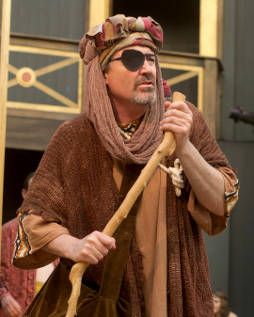
Aiding Rich's quick pacing are a slew of onstage servants, four young cast members in baggy crimson and yellow clothing on each side of the stage, who rush out to act as attendants, to change the set from Egypt to Rome and back again, and most importantly, to provide a wide range of sound effects and musical accompaniment. They also provide the pre-curtain announcements and requests, one of them walking downstage with a cell phone but pausing to smile at the audience with a headshake and an admonitory finger wave. The production begins with the toll of bells and the pound of drums from both sides of the stage as the curtains come down. The rag-clad Soothsayer appears, bearded and eye-patched, slightly hunched with rolls of carpet strapped to his back. He carries a crooked staff and an ominous tone sounds as he delivers his prophesies, provoking fear in his witnesses, especially Cleopatra.
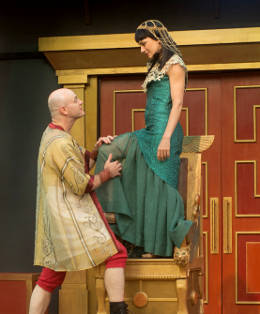
Deborah Staples plays the mercurial Queen Cleopatra in her prime, still young and lean and beautiful, wearing an emerald-green gown that is sheer at the waist, a cap of gold chain on her head. She is smart and pragmatic, but impetuous and emotional, only beginning to perhaps show concern with her age. Her long hair is almost liquid black and shimmering, worn with bangs, and she constantly reveals a flair for the dramatic gesture, standing upon her throne 1.1, a hand defiant on her hip, then feigning aloofness, before attempting to clap her hands 1.2 as if to summon her lover Antony's return. When he does not appear, she searches the edges of the stage - "a Roman thought hath struck him" - her jealousy apparent. When the Roman general does arrive 1.3, Staples's Cleopatra is a flurry of changing emotions, sentimental and sultry, then angry again, locking hands with Antony and struggling against his brawn. She feigns fainting not once but twice, Charmian moving to catch her, and after a lingering kiss of Anthony, shoos him away: "all the gods go with you."
Staples shines as the spoiled brat Cleopatra, sexy and full of vanity, but still imbuing the character with some sympathy despite a penchant for anger. She storms onstage 1.5 to the clatter of cymbals and a drum beat, then lies prone onstage, her arms flailed in melodramatic angst. She admits to her female servants her lust - "a happy horse to bear the weight of Antony" - and as they take her hands and help her stand, she dismisses the male servant Alexas as "not Antony" and leans against an upstage pillar, pouring herself a goblet of wine and flirting with the audience members in one of the paneled booths. Staples's Cleopatra works herself into a fit of anger - "or I'll unpeople Egypt!" - and exits in a queenly huff. Her 2.4 mistreatment of a messenger is mirrored by Antony in 3.13: she enters with a shimmery little belly dance - "give me some music!" - and lies upon some pillows to listen to servants playing drums before rising to meet the black-gloved messenger from Italy. Staples's Cleopatra jumps to conclusions - "Antony is dead!" - then slaps the messenger and throws him down at news Antony has married Octavia: "I'll unhair thy head!" She kicks him in the mouth and chases him from the stage with Alexas's dagger, but the violent scene manages some humor: promising, "I will not bite him," Cleopatra seems surprised to notice her outstretched hand still wielding the knife, and when the messenger attempts to reply, he cradles his injured jaw, his response so slurred as to be barely comprehensible. Her excuse is amusingly fatuous - "it is never good to bring bad news" - and when he returns with more news 3.3, Staples's queen must force a smile, then is pleased at Octavia's lack of height - "dwarfish!" - while laughing at her widowhood before gaping in horror at word Antony's bride is only thirty years of age.
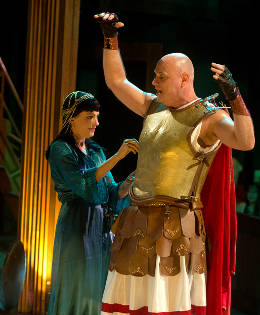
Todd Denning's burly brute Antony gives a parallel mistreatment of a messenger. After his thundering wager of single combat, Staples's Cleopatra moans and purrs as if aroused, but big-eyed and kittenish, turns Antony's jealousy against him. She refers to Caesar as a god - "I kiss his conquering hand" - and accepts a kiss from purple-clad messenger Thidias. Denning's Antony erupts, punching Thidias in the face and manhandling him offstage to be whipped. After screams from offstage, Thidias returns staggering with a flayed and bloody back, but Denning's Antony is merciless, and he kicks Thidias in the ribs then lifts him bodily by the neck to throw him down. Cleopatra's protests are without conviction - "have you done yet!" - and after Antony slaps the exiting messenger on his injured back, he stops her with passionate kisses - "let's mock the midnight bell" - then throws her lustily over his shoulder as they exit upstage. The queen's control of Antony is apparent in the following post-coitus scene, in which she pulls on a green robe as he begins to armor himself. Staples's Cleopatra demurely "helps," but she only kisses him - "a soldier's kiss" - and gets in the way of his servant, then teases Antony by offering him his shield then pulling it from his reach.
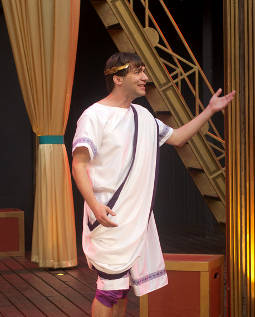
Rich skillfully establishes a strong chemistry between the stars from the opening scenes. Denning's tattooed Antony is big bald and bare-chested, storming onstage 1.1 with steely-eyed resolve, wearing an open white shirt over red pants rolled to the knees and black combat boots. He comes up behind Cleopatra and kisses her, and they dance to pounding drums, holding colorful silken sashes to connect them as three other couples join them. They then lounge and snuggle, and when she rises he scoops her into his arms like a child. Back in Rome by 1.4 with its golden wreaths and white togas, Denning's Antony endures the displeasure of Octavius - "Antony, leave thy lascivious wassails" - and in 2.2 he is charged: "you have broken the article of your oath!" His quick 2.3 agreement to marry Octavia comes as a surprise, as does his lusty kiss of her - "good night, dear lady" - that only ends because of Caesar's interruptive cough. Denning's Antony shows Cleopatra-like anger, leaping at the Soothsayer - "speaketh no more!" - and in 2.7 he is the party animal, pretending comic crocodile tears, splashing Lepidus from his cup, clinking glasses so roughly in a toast that Octavius recoils from sloshing wine, and nearly engaging in a brawl with Pompey.
Rich wisely concentrates his fast-moving narrative on the title characters, so the supporting characters receive little stage time. Pompey is played as a pompous but worthy foe - "the people love me" - just as the militarily powerful Octavius Caesar can be childishly vindictive: "he calls me boy!" Octavia in 3.4 is little more than a dalliance for Denning's Antony, a Roman political plaything with her brown hair in curled ringlets beneath a wreath, mild and cute to Cleopatra's sultry sexiness, destroyed by Antony''s lack of fidelity and collapsing 3.6 to her hands and knees. The best role is Matt Daniel's conflicted Enobarbus, loyal to Antony but finding himself wavering: "he will to his Egyptian dish again." Enobarbus defects to Caesar 4.6, but after a chest-thump salute seeks "a ditch to die," and blue-lit alone in the balcony for 4.10, he repents - "Antony is nobler than my revolt is infamous" - and calls out Antony's name as he commits suicide.
The middle section of Shakespeare's play concerns the battles and Cleopatra's consistent lack of constancy, now in her political machinations. Denning's Antony is angrily insistent on his naval tactics 3.7 - "by sea! by sea!" - and during 3.8 and 3.9 the warriors march toward each other then back away to insistent drumbeats in an abstract portrayal of the battle, and Enobarbus's shout in 3.10 - "naught! Cleopatra's fleet has fled!" - signals the queen's first betrayal and brings intermission. Denning's Antony angrily staggers to center stage 3.11 - "no, no, no!" - to begin the second half, and Staples's Cleopatra first cowers then kneels with Antony center stage to seduce him. Rich moves the action at a crisp pace, Antony staggered by the defection of Enorbarbus 4.5, momentarily victorious 4.7 as Cleopatra leaps into his arms, then, in the middle of a slew of skirmishes at center stage 4.13, he shouts "fly!" to his soldiers and crashes through the upstage doors, returning a moment later: "all is lost!"
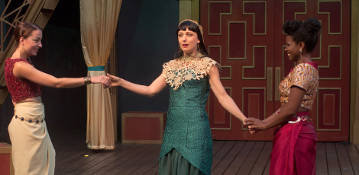
The long tragic conclusion begins 4.14 in crimson light, Denning's Antony first wrathful - "triple-turned whore!" - then reflective - "sun, thy uprise I shall see no more" - as the lights subtly shift to shades of emerald green and Cleopatra approaches from the audience then backs sadly away. Upon hearing of the queen's death, her last word supposedly his name, Denning's deceived Antony drops to one knee, then stabs himself after Eros refuses. He gasps in characteristic frustration when he is informed by Iras that Cleopatra lives. Still, he staggers to her chamber and kneels at her side - "I am dying, Egypt" - then sprawls across her as she embraces him. Staples's Cleopatra calls for a burial detail - "make death be proud to take us" - shuddering as she exits, and to the performer's credit, in her resolve there is sense that she will finally be completely loyal to Antony. At 5.2 she stands under-lit over a stage trap, smoke billowing around her and light flickering, and with Charmian and Iras crouched at her sides, they seem something like Macbeth's witches: "I dreamed there was an Emperor, Antony!"
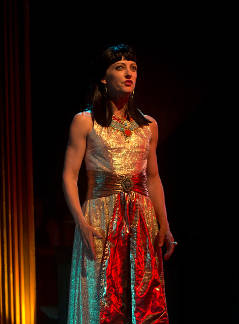
Although tempted by Octavius, Staples's Cleopatra mouths a "thank you" to a servant who slips her a dagger to help her escape humiliation: "an Egyptian puppet shall be shown in Rome." With their shadows playing on the long scrim behind them, the ladies accept the basket of asps and kneel over the trap at center stage. Staples's Cleopatra - "methinks I hear Antony call" - seems to welcome the sting of the snakes, which snap with a noise like the springing of a tightly drawn mouse trap, and she gasps out "I am free" as Iras kisses her and she dies, her eyes wide open as she sees Denning's spirit of Antony at the edge of the stage.
Rich concludes with Charmian's own act of loyalty (she closes the Queen's eyes, puts her own hand into the basket - snap! - and falls), and Octavius's final words: "she will be buried by her Antony." The closing image, while not Cleopatra or her Antony, is memorable: Octavius addresses the audience directly, to a sudden blackout, followed by a dramatic red flash, then another now final sudden darkness.